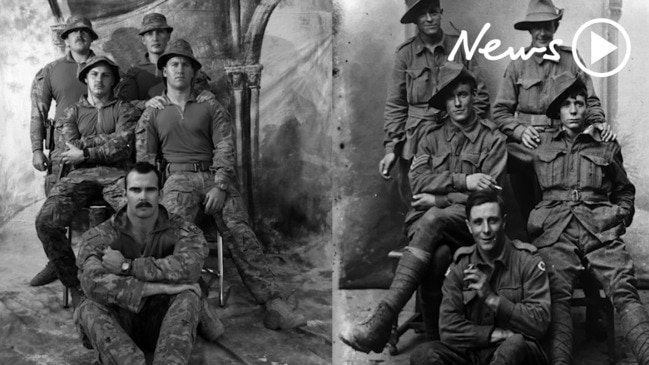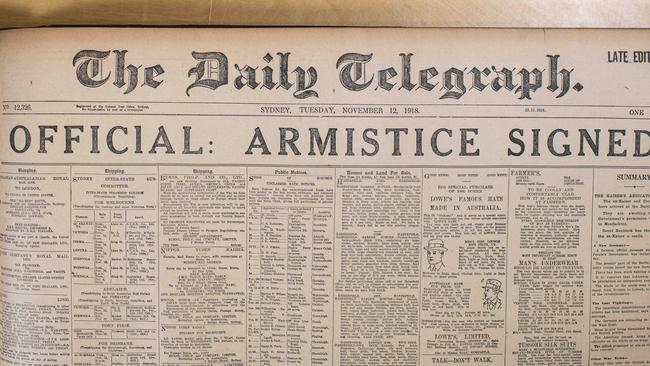Simple headline so rich in meaning for so many
It didn’t take many words to tell readers the news they had been waiting for during four horrific years of war. The Daily Telegraph’s front page on Tuesday, November 12, 1918, said simply in a giant headline: “OFFICIAL: ARMISTICE SIGNED”.

- Remembrance Day 2018: Warren Brown’s salute to WW1 heroes
- Remembrance Day 2018: WWI diaries, letters from soldiers
IT didn’t take many words to tell readers the news they had been waiting for during four horrific years of war.
The Daily Telegraph’s front page on Tuesday, November 12, 1918, said simply in a giant headline: “OFFICIAL: ARMISTICE SIGNED”.
On Page 5 it carried a copy of the official cable that was sent to the newspaper’s Sydney office at 7.52pm local time on November 11, confirming the armistice that ended World War 1 had been signed.
MORE NEWS:
Maximum security inmates in violent brawl
Glenn McGrath’s wife’s stunning transformation
More criminals pulled off flights to Australia
It also revealed how the signing of the armistice was held-up by the war-ravaged state of the roads.
“It was hinted in well-informed quarters that (Allied Supreme Commander, Marshal Ferdinand) Foch might extend the time limit for the reply to the Armistice, because the Courier going to Spa (German headquarters) was considerably delayed by the bad roads,” the story read.
“It was later learnt from authoritative quarters that as a result of the Kaiser’s abdication the German Government might address a request to the Allies to mitigate the severity of the Armistice Terms.”
Any pleas for mercy from Germany after the abdication of their monarch, however, would not affect the harsh terms of the Armistice, described in the paper as the “Allies’ drastic and unrelenting demands”.

The Allies’ demands included the immediate evacuation by Germany of France, Alsace, Lorraine, Belgium and Luxembourg within 14 days.
The paper went on to list the other terms of the surrender — including the immediate repatriation of prisoners of war and the dismantling of the German navy.
The defeated power’s 160 submarines, six battle cruisers, 10 battleships and other submarines and warships were to be surrendered, “paid off and disarmed”.
A day earlier, The Daily Telegraph had reported how the Kaiser’s abdication had been greeted by a jubilant British people.
“The British public is jubilant over the official announcement of the abdication,” the paper read.
“The streets of London are full of cheering crowds, and the church bells are ringing.”
In the style of the paper, which has changed little, it carried an in-depth story of who Kaiser William II was, along with a large photograph of the monarch with his six sons.
“As a child William already showed great wilfulness and arrogance, so that Prince Hobenfohe could note in his diary that ‘his mother is afraid of him, and he also comes into conflict with his father’,” it was reported.
On November 12, the paper reported the Kaiser had arrived in The Netherlands in the hope of living in exile.


